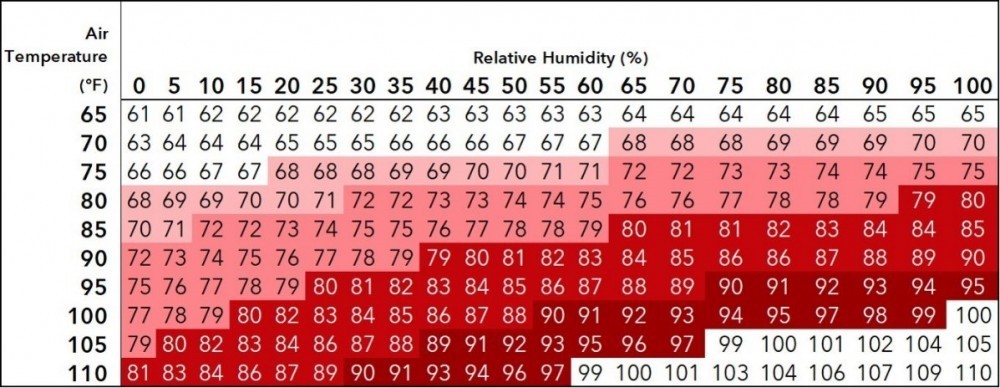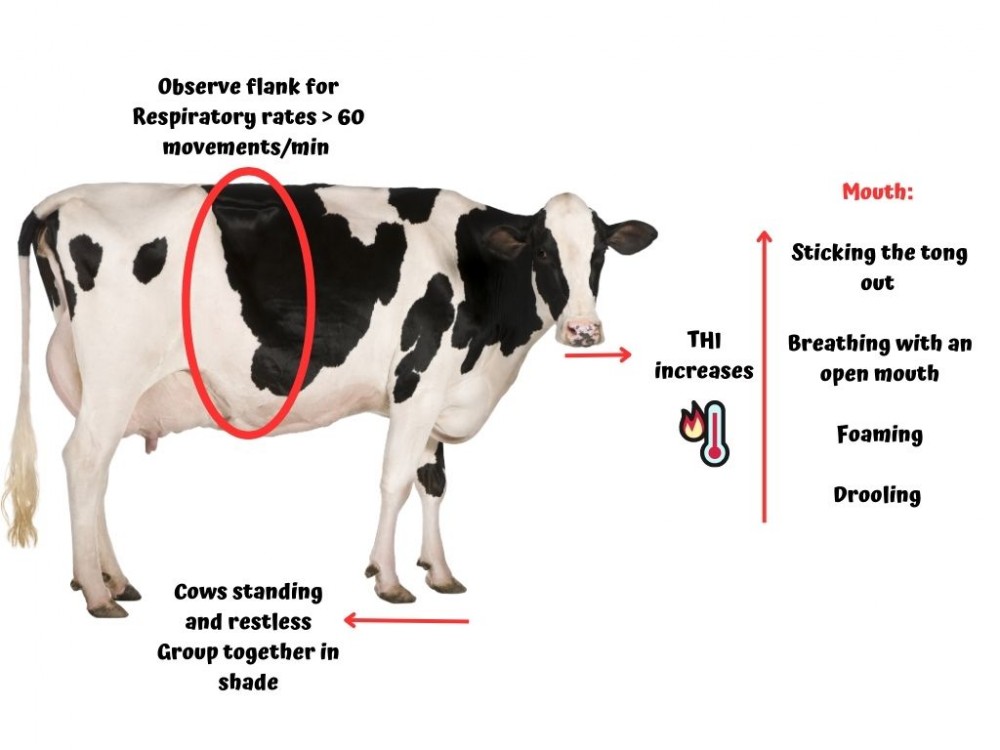Too hot to handle: Episodic heat stress can be tough on cows
Camila Lage, Dairy Management Specialist
Southwest New York Dairy, Livestock and Field Crops Program
Too hot to handle: Episodic heat stress can be tough on cows
By Camila Lage, Dairy Management Specialist
It is still spring, but you are probably already observing some signs of discomfort in your cows since we see days in the high 80s. I always believed the Northeast weather wouldn't be so bad on cows, but that's not true. Since it takes weeks for cows to acclimate to the heat, episodic heat stress is tough for cows to handle. Investing in heat abatement is a cost-benefit, even in our "moderate climate" area.
Like us, cows have a temperature and humidity in which they are comfortable, called the thermal neutral zone. The combination of temperature and humidity better shows the environmental effects than each factor individually. For example, we can have a hot day (90 F) that's not humid (0% humidity), and it will feel the same as a moderate day (75 F) with 65% humidity. Looking at Figure 1 below, you can see that the THI, or Temperature-Humidit Index, is 72 in both examples. As I write this article, the temperature outside is 86 F, and the humidity is 30%, which gives us a THI of 75. Research shows that cows, especially our high-producing ones, start experiencing heat stress when THI is around 68. Some researchers are already proposing this number to be lower (65).

Figure 1. THI index chart is based on air temperature and relative humidity (%)
Data from St-Pierre et al. (2003) estimated that cows in NY spend 8.2% of their hours during the year heat-stressed, which is enough to generate losses of $23 million per year when we account for the loss in DMI, milk production, fertility, increased cull rate and death rates. A study by Miner Institute 2016 observed that cows producing more than 77 lbs per day lost at least 5 lbs of milk/day when the average THI was 68 or higher for more than 17 hours daily.
Cows' heat load is composed of the heat produced by their metabolism and the heat gained from the environment. When the temperature rises, cows must stand longer to control their body temperature since it increases 2x when they lying down compared to when they are standing. Therefore, one of the first signs of heat stress, especially sporadic heat stress, is a higher proportion of cows standing, moving from the side of the barn, and bunching.
More classic signs of heat stress include rapid breathing, open-mouth panting, increased water intake, decreased activity and feed intake, and/or reduced milk production. When you notice cows breathing with 60 or more movements per minute, this indicates that they are struggling to cope adequately with the heat, and additional cooling would be beneficial.

Figure 2. Signs of heat stress on cows
During the 2023 Cornell Herd Health Conference, Dr. Katie Ballard from Miner Institute shared that, based on Miner heat stress studies, cows under sporadic heat stress have a greater risk of acidosis. This is related to a reduction in rumination, slug feeding, and reduced buffer capacity due to panting (losses of CO2 when breathing rapidly)
As temperature and humidity rise, let's not forget about the basic principles to help animals stay comfortable and profitable:
- Make sure animals have access to fresh water.
- Provide shade (to all animals, and if you have grazing animals, make sure to read this).
- Make sure you have enough ventilation (pens and holding pens).
- Invest in fans that move air - 4-6 mph continuous air speed reccomended
- Position fans that move air across cows when they are standing and lying
- Don't forget to clean and perform periodical maintenance on fans to maximize peak efficiency
- Don't turn fans off- Cows have their highest body temperature at night
- Consider adopting water cooling (sprinklers/misters) for more effective cooling.
Reach out to Camila Lage at 607-422-6788 if you are interested to learn more or want help to troubleshoot your facilities.
Upcoming Events
WEBINAR - Automated Milking Systems Efficiency: Balancing Focus on Individual Cows and System Optimization
May 8, 2024
Please join Cornell the SWNY team and MSU Extension for our talk with Dr. Pablo Silva Boloña on improving efficiency of Automated milking systems by focusing on milking settings for individual and group success.
Broiler Field Day at Sunny Cove Farm
June 6, 2024
Alfred Station, NY
Join us for a field day to explore broiler production, processing, and finances. Meghan Snyder of Sunny Cove Farm will be our host. She raises small batches of organic broilers, processing them on-farm under the 1,000 bird exemption.
Cornell Seed Growers Field Day
July 2, 2024
Ithaca, NY
Please Save the Date for the Cornell Seed Growers Field Day to be held the morning of July 2nd. The event will be held at the NYSIP Foundation Seed Barn, 791 Dryden Rd., Rt. 366, Ithaca, NY.
Announcements
No announcements at this time.





